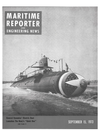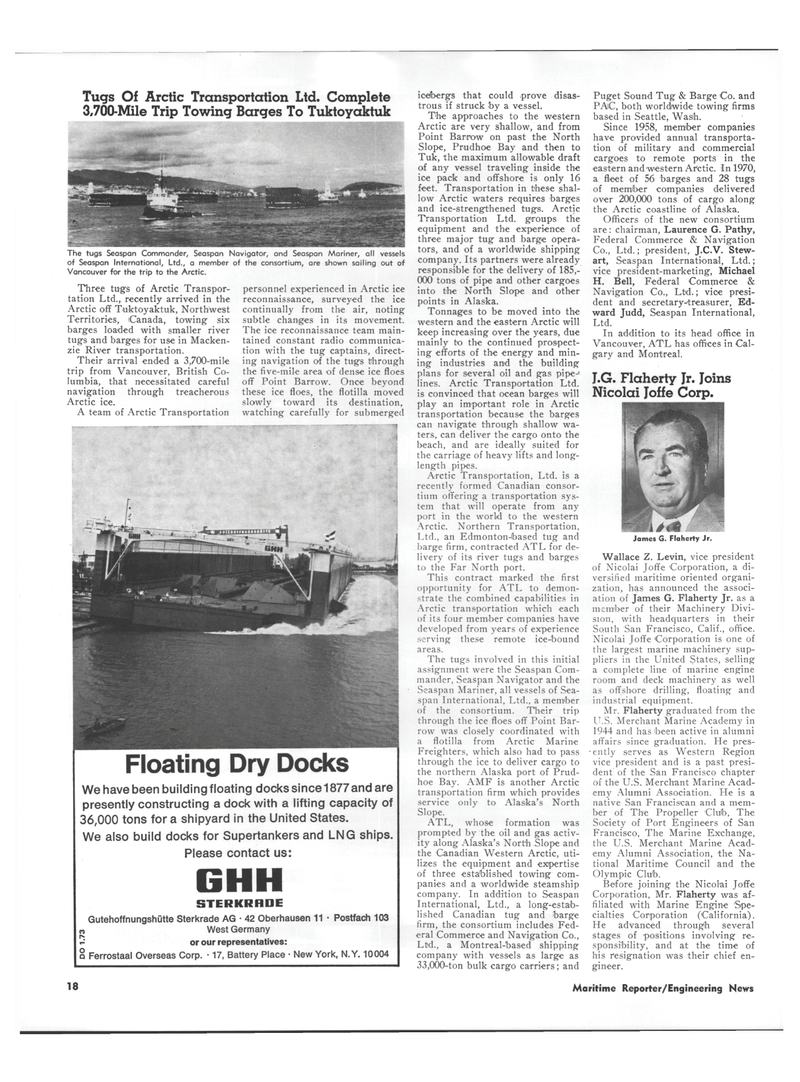
Page 16: of Maritime Reporter Magazine (September 15, 1973)
Read this page in Pdf, Flash or Html5 edition of September 15, 1973 Maritime Reporter Magazine
Tugs Of Arctic Transportation Ltd. Complete 3,700-Mile Trip Towing Barges To Tuktoyaktuk
The tugs Seaspan Commander, Seaspan Navigator, and Seaspan Mariner, all vessels of Seaspan International, Ltd., a member of the consortium, are shown sailing out of
Vancouver for the trip to the Arctic.
Three tugs of Arctic Transpor- tation Ltd., recently arrived in the
Arctic off Tuktoyaktuk, Northwest
Territories, Canada, towing six barges loaded with smaller river tugs and barges for use in Macken- zie River transportation.
Their arrival ended a 3,700-mile trip from Vancouver, British Co- lumbia, that necessitated careful navigation through treacherous
Arctic ice.
A team of Arctic Transportation personnel experienced in Arctic ice reconnaissance, surveyed the ice continually from the air, noting subtle changes in its movement.
The ice reconnaissance team main- tained constant radio communica- tion with the tug captains, direct- ing navigation of the tugs through the five-mile area of dense ice floes off Point Barrow. Once beyond these ice floes, the flotilla moved slowly toward its destination, watching carefully for submerged ice/bergs that could prove disas- trous if struck by a vessel.
The approaches to the western
Arctic are very shallow, and from
Point Barrow on past the North
Slope, Prudhoe Bay and then to
Tuk, the maximum allowable draft of any vessel traveling inside the ice pack and offshore is only 16 feet. Transportation in these shal- low Arctic waters requires barges and ice-strengthened tugs. Arctic
Transportation Ltd. groups the equipment and the experience of three major tug and barge opera- tors, and of a worldwide shipping company. Its partners were already responsible for the delivery of 185,- 000 tons of pipe and other cargoes into the North Slope and other points in Alaska.
Tonnages to be moved into the western and the eastern Arctic will keep increasing over the years, due mainly to the continued prospect- ing efforts of the energy and min- ing industries and the building plans for several oil and gas pipeJ lines. Arctic Transportation Ltd. is convinced that ocean barges will play an important role in Arctic transportation because the barges can navigate through shallow wa- ters, can deliver the cargo onto the beach, and are ideally suited for the carriage of heavy lifts and long- length pipes.
Arctic Transportation, Ltd. is a recently formed Canadian consor- tium offering a transportation sys- tem that will operate from any port in the world to the western
Arctic. Northern Transportation,
Ltd., an Edmonton-based tug and barge firm, contracted ATL for de- livery of its river tugs and barges to the Far North port.
This contract marked the first opportunity for ATL to demon- strate the combined capabilities in
Arctic transportation which each of its four member companies have developed from years of experience serving these remote ice-bound areas.
The tugs involved in this initial assignment were the Seaspan Com- mander, Seaspan Navigator and the
Seaspan Mariner, all vessels of Sea- span International, Ltd., a member of the consortium. Their trip through the ice floes off Point Bar- row was closely coordinated with a flotilla from Arctic Marine
Freighters, which also had to pass through the ice to deliver cargo to the northern Alaska port of Prud- hoe Bay. AMF is another Arctic transportation firm which provides service only to Alaska's North
Slope.
ATL, whose formation was prompted by the oil and gas activ- ity along Alaska's North Slope and the Canadian Western Arctic, uti- lizes the equipment and expertise of three established towing com- panies and a worldwide steamship company. In addition to Seaspan
International, Ltd., a long-estab- lished Canadian tug and barge firm, the consortium includes Fed- eral Commerce and Navigation Co.,
Ltd., a Montreal-based shipping company with vessels as large as 33,000-ton bulk cargo carriers; and
Puget Sound Tug & Barge Co. and
PAC, both worldwide towing firms based in Seattle, Wash.
Since 1958, member companies have provided annual transporta- tion of military and commercial cargoes to remote ports in the eastern and western Arctic. In 1970, a fleet of 56 barges and 28 tugs of member companies delivered over 200,000 tons of cargo along the Arctic coastline of Alaska.
Officers of the new consortium are: chairman, Laurence G. Pathy,
Federal Commerce & Navigation
Co., Ltd.; president, J.C.V. Stew- art, Seaspan International, Ltd.; vice president-marketing, Michael
H. Bell, Federal Commerce &
Navigation Co., Ltd.; vice presi- dent and secretary-treasurer, Ed- ward Judd, Seaspan International,
Ltd.
In addition to its head office in
Vancouver, ATL has offices in Cal- gary and Montreal.
J.G. Flaherty Jr. Joins
Nicolai Joffe Corp.
James G. Flaherty Jr.
Wallace Z. Levin, vice president of Nicolai Joffe Corporation, a di- versified maritime oriented organi- zation, has announced the associ- ation of James G. Flaherty Jr. as a member of their Machinery Divi- sion, with headquarters in their
South San Francisco, Calif., office.
Nicolai Joffe Corporation is one of the largest marine machinery sup- pliers in the United States, selling a complete line of marine engine room and deck machinery as well as offshore drilling, floating and industrial equipment.
Mr. Flaherty graduated from the
U.S. Merchant Marine Academy in 1944 and has been active in alumni affairs since graduation. He pres- •ently serves as Western Region vice president and is a past presi- dent of the San Francisco chapter of the U.S. Merchant Marine Acad- emy Alumni Association. He is a native San Franciscan and a mem- ber of The Propeller Club, The
Society of Port Engineers of San
Francisco, The Marine Exchange, the U.S. Merchant Marine Acad- emy Alumni Association, the Na- tional Maritime Council and the
Olympic Club.
Before joining the Nicolai Joffe
Corporation, Mr. Flaherty was af- filiated with Marine Engine 'Spe- cialties Corporation (California).
He advanced through several stages of positions involving- re- sponsibility, and at the time of his resignation was their chief en- gineer.
Floating Dry Docks
We have been building floating docks since 1877 and are presently constructing a dock with a lifting capacity of 36,000 tons for a shipyard in the United States.
We also build docks for Supertankers and LNG ships.
Please contact us:
GHH
STERKRHDE
Gutehoffnungshutte Sterkrade AG • 42 Oberhausen 11 • Postfach 103 n West Germany or our representatives: a Ferrostaal Overseas Corp. • 17, Battery Place • New York, N. Y. 10004 18 Maritime Reporter/Engineering News

 15
15

 17
17
